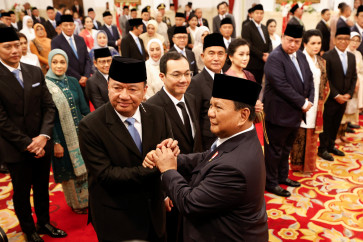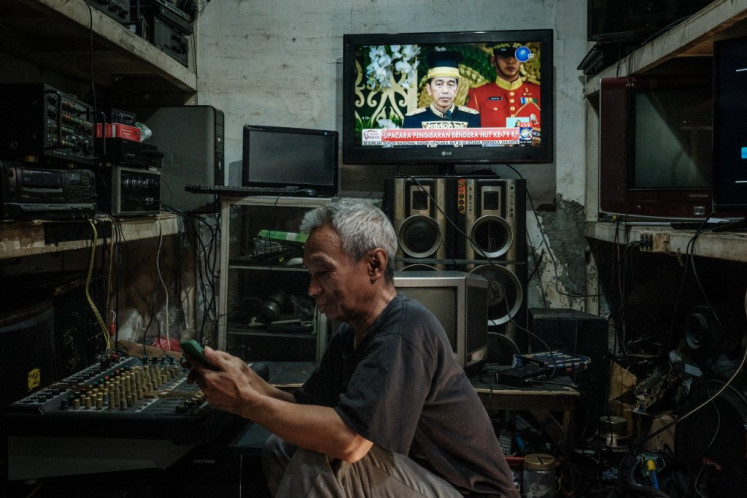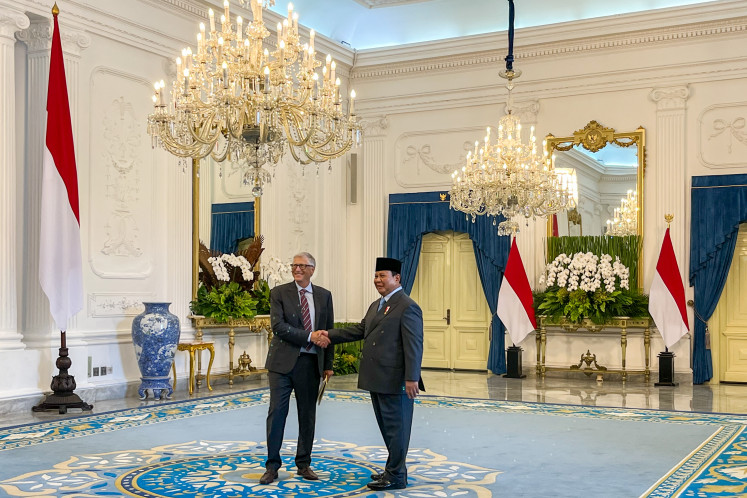Monkeying with the environment?
Were you taught the Darwinian theory of evolution at school? Yes, it's complex, covering the origins of earth, life, humanity and the universe, but its opponents like to reduce it to a simple, inflammatory statement: "We're all descendants of the apes"
Change text size
Gift Premium Articles
to Anyone

W
ere you taught the Darwinian theory of evolution at school? Yes, it's complex, covering the origins of earth, life, humanity and the universe, but its opponents like to reduce it to a simple, inflammatory statement: "We're all descendants of the apes". No wonder evolutionism was met with opposition. Who wants to admit grandpa was a monkey?
In fact Darwin never actually made that claim, but he would certainly have agreed that there is a very meaningful and important connection between apes and us, and, in particular, orangutans.
The connection relates to the place orangutans live: forests (after all, the word "orangutan" means "man of the forest" in Indonesian). This is because forests are an essential part of human life.
In fact, they may even be critical to our survival and that of the planet we share with these big hairy orange primates.
Forests are a vital part of the earth's ecosystem and Indonesia has some of the largest rainforests in the world. That's the good news. The bad news is that we have also experienced one of the highest rates of deforestation in the world.
Forty percent of the vast forests that stretched across Indonesia in the 1950s were cleared in the following 50 years, reduced from 162 to 98 million hectares by excessive logging, illegal logging, and slash-and-burn agriculture, as well by encroaching palm oil plantations, especially on peat lands.
The result is CO2 "volcanoes" that make Indonesia the third-largest emitter of greenhouse gasses in the world after China and the US. But unlike these two countries with their vast industries, we manage to produce 80 percent of our emissions from environmental degradation!
But while successive governments in Indonesia have failed to ensure the protection of tropical forests in Indonesia (and have even colluded in their destruction) there is one man who in just a few years has created a new rainforest - the most species rich in the world! And all this simply because of Uce, a sick, dying baby orangutan, with "the saddest eyes *he had* ever seen", that he found in a market garbage dump in Balikpapan in 1989.
Yes, Willie Smits is an amazing and inspiring man, and I had the good fortune recently to meet him at the Ashoka Fellows Induction ceremony (see http://www.ashoka.org/fellows).
I had heard about him and his famous Borneo Orangutan Survival (BOS) project (which has branches worldwide), set up in 1991 near Balikpapan in Kalimantan, just two years after his encounter with Uce.
I had not realized, however, that at one point he had as many as 1,000 orangutans squeezed into two crowded orangutan reintroduction programs, Wanariset and Nyaru Menteng, both in East Kalimantan.
This was more orangutans than in all the zoos in all the world, and Smits simply didn't know where to put them all! Knowing that a proper home for his charges would inevitably require a rainforest, he decided to create one as a back up, at the same time functioning as a gene bank for Borneo's fast dwindling genetic resources.
So in 2002 Smits created Samboja Lestari in an area in East Kalimantan where there was just yellow terrain, with no wildlife or agricultural productivity.
It was, in fact, the poorest area in the district, and not surprisingly, had a high crime rate. But within just four years, Smits had created 3,000 jobs, and Samboja Lestari no longer holds the local poverty record.
What's more, the climate has also been changed, for the better. Flooding has stopped, the fires that used to sweep through the area have also stopped, and a huge surge in biodiversity took place: more than 1,000 species of trees, 137 bird species, and 30 species of reptiles.
Now, how many people do you know that can claim to have changed the climate?
How did Smits do it?
Answer: He planted 5,000 acres of mixed forest with 1,232 different tree species. After six years, the cloud cover over Samboja Lestari increased by 12 percent!
The new forest cooled the atmosphere, and that attracted rain clouds. Like the sprinklers you find in hotel rooms that go off automatically when there is a fire, "our forest protects itself from fires because it generates a lot of rain," says Smits.
In fact, his young forest is generating so much rainwater that it should be able to provide the 300,000 citizens of Balikpapan with clean drinking water through a big project with Dutch government support!
Smits also planted sugar palms around the forest, thus creating a protective ring around it, as sugar palms are fire and flood resistant. In addition, local people can tap the trees, process it into sugar and have another regular source of income. How sweet is that?
And by combining agriculture with forestry in other ways - planting fruit species and medicinal plants - Smits was also able to provide local people with livelihoods that they had not had before, and natural and sustainable ones to boot.
By combining forestry with agriculture, an infrastructure was created that yielded economic value. A management system was also created, skills developed, and other principles like transparency (make a system that's difficult to corrupt!), professional management, etc were added on.
But most importantly, the local people were involved every step of the way, so that they would naturally become staunch defenders of the forest - because their livelihood now depended on it, just as the orangutans depend on it for their natural habitat.
Willie Smits pieced together a complex ecological puzzle and succeeded in regenerating rainforests in Kalimantan.
In the process, he saved local orangutans and created an exciting blueprint for restoring fragile ecosystems on the basis of "people, profit, planet" principles.
Now there's something we should export to other places in the world - it would be a whole lot better than just exporting forest fire smoke, don't you think?









